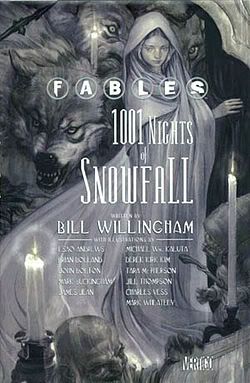I've heard about the Fables series over the years but never had a chance to read them and I've been a bit too intimidated to blind buy them at the bookstore, there were always so many different issues and I had no idea where to start. But when I picked up this book at the local college library the very first page was an introduction for new readers and explained that this book was set before the story proper. Well, that takes care of all of my inital problems, so how did the book itself fare?
Fables: 1001 Nights of Snowfall by Bill Willingham and illustrated by James Jean and Charles Vess
Summary: Fables is a world where all fairy tales come from a common place and have escaped The Adversary by coming to our world and living in a small, close knit community in America. But not long after their escape, and before the story proper begins, Snow White travels to the Arabian section of their fairy tale land to warn of The Adversary and offer them a place in their new life. She accidentally becomes the queen of King Shahryar who plans to kill her at sunrise since he no longer trusts women. In order to prolong her life, Snow White begins to tell him tales of the old world and has many tales to tell.
The Good: By the end of this volume I had not only a good feel for how this story was paced but also of the backstory leading up to the main tale and the history of what seem to several major characters. It was a great introduction to the series, perfectly bringing in exposition while not overwhelming the entire story, the stories themselves were interesting, and Willingham tied it all together very well in the end. I was glad to see at least a mention of fairy tales that weren't European based (since I have seen many of these "all legends are real" mash-ups over the years but usually "all stories" ends up meaning "just European, with a focus on Western European, tales") and that inclusion is the biggest reason that I am just a bit curious about the rest of the series.
The Bad: Years ago I read a very good adaptation of 1001 Nights (Shadow Spinner by Susan Fletcher, a middle grade book) and ever since I've been rather biased when it comes to retellings and I didn't find the overall story here quite as gripping as that one. There wasn't anything wrong with Snow White or her own story, it just wasn't as amazing and I was kinda miffed that Scheherazade only had a paragraph of screen time. I felt like there were one or two parts that would have made more sense if I had been familiar with the rest of the series (like the part with The Big Bad Wolf) but that only happened a few times.
The Art: Amazon only lists two illustrators for this volume which I really hope is right since it seemed like there were more than two art styles in the book. Rather surprisingly for me I liked most, although not all, of the art in the book* and, given that the book was composed of many smaller stories within a larger one, I didn't find the art shifts jarring and they made sense. All of the stories were also very easy to follow paneling wise which seems a bit like a silly thing to mention but I have come across so many stories where you can tell the artist is an amateur because they don't understand how an eye looks at the page. Here there were no problems at all and it made reading this much easier and go much faster.
So, will I track down more volumes of Fables after this? Probably not actually, the series is still on-going, huge, like I said earlier I don't have easy access to it, and it seems to have much greater variety of artists and I didn't really like the art in the volumes I've flipped through before. Despite their best efforts here, which were fantastic, it's a bit of an intimidating series to get into, so for the moment I'll stick with all the other series I already follow that revolve around the "all stories are true" premise.
*surprising only because I don't seem to like the art style in most American comics books, which isn't for any particular reason I've been able to figure out but there are just a few stylistic things I come across in American comic books (verses manga/manhaw/webcomics) that I've disliked since elementary school, years before I read any other comics.
